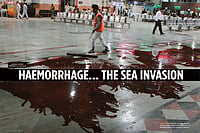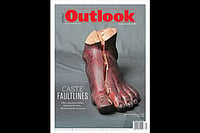The Country With a Burnt Post Office
MOTHER COLLECTED THE SHROUD, A green cloth embroidered with Quranic verses, a box of incense sticks, and a packed bar of soap that would be needed the next day for burial.
‘Can you help me put these back in the cupboard?’ She asked me to fold the chadors and some unstitched pieces of cloth that she’d taken out of various bags.
It was common practice for Father to bring reams of fabric from the shop for Mother. However, she didn’t always get all of them stitched. Instead, she kept some aside or gave away some as gifts to relatives. That cupboard was her treasure trove.
She and Father rushed downstairs.
I sat alone in the antechamber of their bedroom, folding the pieces of fabric and arranging them on the almirah shelves. The pieces I was trying to fold were puffed up. I had to refold them, match the original creases, put them into bags, and then readjust the bags so the shelves wouldn’t spill over. It made my task more time-consuming and my arms felt fatigued. While arranging the cloth and bags, I stumbled upon a soft leather bag full of LPs, old Urdu magazines, and an old blazer which was part of my school uniform at some point. I looked at the LP covers, and then, out of curiosity, checked the pockets of the green blazer. I was surprised to find an old letter that I had written to Vaseem in 1993. I hadn’t expected that unsent love letter to spring out from an unlikely corner of the house…
Most break-ups are painful. Some are acrimonious. Mine was neither. I lost my first love to a burnt post-office. It was a romance that was cut short by fire. A romance that had blossomed on the balcony of Baji, my maternal aunt, and ended up in smoke.
Three years after Tehreek began, I was to finally graduate from high school. The annual exams at the end of 1992 worried Mother more than me. As soon as the schedule of the pre-boards was out, Mother solemnly declared the weeks to follow to be the ‘most crucial’. She decided to send me to her sister Razia’s house in Raj Bagh. I fondly called that aunt of mine, Baji.
Baji lived near my school, and that would give me more time to revise and less time to be anxious about the commute. I was expected to return home after the final paper, which would be held in two weeks’ time.
Baji’s large house was tucked away in a small and quiet neighbourhood, far away from the madness of the city. Though calm prevailed outside in their neighbourhood, their joint family ensured that there was none inside the house. With about twelve family members, their house was always noisy and full of pleasant distractions. The men – her sons, husband, brother-in-law and his son – owned two shops and a small motel near the restive Maisuma Bazar. Since the area was under constant siege – because that is where Yasin Malik, one of the four founders of JKLF (Jammu and Kashmir Liberation Front), lived – they usually stayed home.
With a tight exam schedule, and hardly a day in between papers, I had no luxury to dawdle. During the daytime, as there was rarely a quiet moment indoors, I turned the balcony outside Baji’s bedroom into my study. The balcony overlooked her manicured rose garden. Weeping willows lined the tranquil alleyway. It made a pleasing canopy that kept the afternoon sun at bay. The breeze rustled the leaves, creating a soothing and understated symphony that made it more conducive to napping than studying.
Baji would join me for nun chai at four o’clock on the balcony. One such afternoon, she walked in with the tea, and the date sheet that had been published in a newspaper was on the tray too. The sight of newspaper made me nervous.
‘It’s so peaceful here. We can’t even imagine this calm in the tense downtown of ours. It used to be one of the busiest streets, but it’s so scary now. Something or the other keeps happening there. You can’t study in peace anymore. I miss sitting on the windowsill with Bobeh. We rarely get to open the windows. I wish our home was as cocooned as yours,’ I said.
Baji raised both her eyebrows, as if in disbelief. A sudden fear came over her face. ‘Kyah tchakh vanaan? Don’t you remember most of the dead on Gaw Kadal were from here? From around this area? Right there across the bund is where most of them lived: in Mahjoor Nagar, Radio Colony, Ikhraaj pur…’ She then stared at the staircase leading to the bund.
Our tea got cold. I didn’t know what to say to my aunt who had not only gone silent but also had a faraway look in her eyes. Was she still thinking about the firing at Gaw Kadal in 1990? I picked up the newspaper. Both her silence and daze were broken by a greeting. She was responding to Vaseem, her sister-in-law’s son, who lived nearby.
Vaseem was older than me by four years. I had seen him cycle past their house sometimes. He’d smile at me. I noticed that he didn’t have an aquiline nose or bony features like the rest of us. His cheeks had somehow still retained their redness. He looked more Ladakhi than Kashmiri, I thought. Same, nonetheless.
On the day of my second exam, I was walking back from school when I spotted a racer bike approaching me. It was him. He braked swiftly and boldly struck up a conversation with me. Most of the boys I had known then would usually hatch a complicated plan with their friends if they wanted to talk to a girl. It felt mildly awkward speaking to a known stranger. He was very confident. I didn’t resist. I noticed that he had a thin line of very fine lashes, which were only visible when his smile crinkled his eyes.
*Excerpted from Farah Bashir's Rumours of Spring: A Girlhood in Kashmir with permission from HarperCollins India*


























